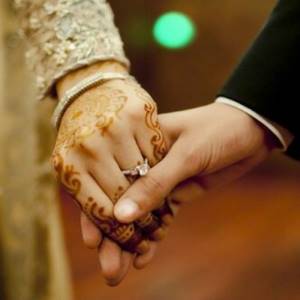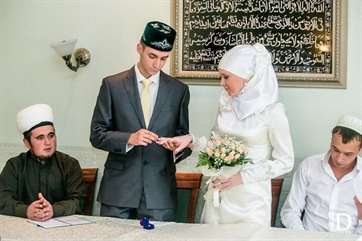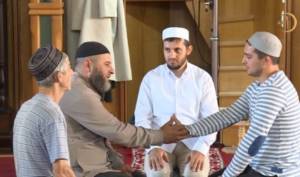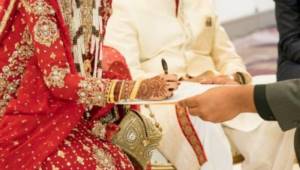- Customs before Nikah Night of Henna
- Wedding dress in Islam
- Marriage of a Muslim to a Christian
An Islamic wedding or celebration ( walima ) occurs after a wedding ceremony similar to that of Christians. Muslims call this ritual nikah . From the point of view of Islamic law, the concept of nikah has a broader meaning: nikah is a religious agreement, after the conclusion of which the relationship between a Muslim man and a Muslim woman becomes permissible, and also confirms that there are no obstacles to marriage.
One of the names of Islamic marriage or nikah is zawaj .
The purpose of nikah is to create a Muslim family as the basis for the well-being and prosperity of the Muslim community. Nikah unites people; this ritual helps to establish relationships of cooperation and mutual understanding among future relatives.
In Islam, a Muslim man can marry four women, but he must show them equal respect and also support them financially at an equal level, according to their necessary needs. According to Islam, a true believing Muslim treats his wife with love and respect and has the best character.
Customs before nikah
On the part of the Muslim groom, it is necessary to comply with the following conditions and requirements before the Muslim wedding:
- In Islam, it is advisable to have a wedding with a girl you like. The Messenger of Allah ﷺ said: “ For two loving hearts, there is nothing more worthy than marriage .” But a Muslim must choose as his wife the girl who suits him in her values and worldview - if this is so, then the man should hint to the girl about his intentions on nikahs;
- if a girl reciprocates a man’s feelings, then the groom should meet her parents in order to obtain permission from them to marry their daughter and their blessing;
- when the girl’s consent is received and her parents’ blessing is received, the groom must comply with the following condition of a Muslim wedding - organize matchmaking and then engagement;
- After the engagement ceremony, the bride and groom cannot touch each other and enter into intimate relationships before the nikah ceremony is performed; the bride and groom are still considered strangers to each other. But the engagement gives them the opportunity to communicate among their relatives.
- After all the specified conditions are met, the groom can set the date for the nikah and wedding.
Matchmaking before an Islamic wedding involves receiving parental blessings, and on this day the date for the wedding is chosen. On the day of the engagement, the parents of the bride and groom usually discuss all issues related to the financial support of the wedding and all organizational issues.
Henna night

Traditionally, some Muslim weddings involve a night of seeing off the bride and groom, which is called “henna night”: the newlyweds spend this night with their family. In the house where the bride lives, women gather and paint the bride’s palms and feet with a special wedding henna design. Relatives help the bride put on a beautiful, embroidered dress. The bride must cover her face with an opaque veil. On Henna Night, girls and women gathered in the bride's house can sing songs for the bride.
The men, gathered in the house where the Muslim groom lives, are having fun. In his house, a ceremony is held that is similar to the women's: the man's relatives and friends of the groom congratulate him, give him advice and instructions, and express wishes for happiness.
Wedding dress in Islam
A modern Islamic wedding does not prescribe any single standard in wedding attire, and it largely depends on the taste of the bride and fashion trends. What distinguishes modern Muslim wedding attire from Western wedding attire is the rule that the bride’s dress must be closed, and only the hands can remain visible, as well as the feet and face. The fabric from which the wedding dress is made is given serious importance: the fabrics can be beautiful, but discreet, opaque, and the outfit itself should be tailored so that it does not hug the bride’s figure, covering her legs, shoulders, neck, chest and arms. The bride's outfit depends on how strict the rules and laws of Sharia are in the country: in some countries there are requirements that the bride must wear gloves to cover her hands and cover her face with a veil at a Muslim wedding.
Marriage of a Muslim to a Christian
According to Islam, marriage is possible between a Muslim and a Christian, but only if a number of conditions are met.
Since nikkah is a norm of Islam, which was especially revered by our ancestors and which has been observed for many centuries unquestioningly by Muslims all over the world, it confirms both the strength of the feelings of the young and the sincerity of their intentions. A Muslim can marry a woman who belongs to any religion, but she must be a sincerely believing woman who observes all religious rituals. When a nikah is performed with a Christian woman, the ceremony can be held without the bride renouncing her faith - this is permitted in Islam. If the young woman has decided to become a Muslim, then during the nikah ceremony she can read the shahada, in which they praise the One God Allah - this will automatically transfer her to the status of a Muslim wife.
For more information about marriage between a Christian and a Muslim, read this article.
Read here what it's like to marry a Muslim.
Nikah conditions
A Muslim wedding begins with the Nikah ceremony, which is carried out subject to a number of conditions:
- For a wedding to take place in Islam, it is necessary that the bride’s guardian, the bride herself, and the groom give consent to the nikkah, and this consent must be given voluntarily and must be mutual;
- the marriage ceremony is carried out in the presence of at least two male Muslim witnesses;
- a wedding in Islam cannot be held if there is a Sharia prohibition: a Muslim woman is prohibited from marrying a non-Muslim man, a man can marry a non-Muslim woman, provided that she is not an unbeliever or polytheist, and should not be a blood relative or dairy relative to the groom;
- An Islamic wedding instructs the groom to give his future wife such marriage gift ( mahr ) as she wishes. A Muslim gives his future wife a gift, having listened to her request - the gift can be intangible (pilgrimage) or material (money or jewelry).
Another important condition for a Muslim wedding is its openness and publicity, as well as the absence of time restrictions. Future children born in this marriage must belong to the religion of the Muslim father - this is also a prerequisite for a wedding in Islam.
The traditions and customs of different nations in organizing nikah and holding a wedding differ, and celebrations can be organized in different ways, but it is important that during the celebration nothing that would be forbidden in religion is allowed - the presence of alcoholic beverages, non-halal treats.
After a Muslim wedding, nikah, the husband and wife receive rights to each other, which is why weddings in Islam are given important sacred significance.
Mandatory nikah ceremony
If you are a true Muslim, then you should follow all customs. Therefore, before the wedding, a traditional ceremony called “nikah” should be held. This ceremony is reminiscent of a Christian wedding.
This ritual goes as follows.
- To do this, you should invite a Muslim priest. He must be a believer and know the laws of the Koran well.
- The ceremony takes place in the mosque. The newlyweds go accompanied by their parents and witnesses.
- According to custom, two men must be witnesses, but according to Sharia law, the presence of two women and one man is allowed.
- People who are representatives of another religion are prohibited from staying there.
- The head must be covered with a hat. And women dress in closed Muslim dresses.
Editor's choice: Red summer wedding: royal interior

Conducting a nikkah ceremony in Islam

When all the pre-wedding rituals are completed, it is time for the actual wedding. The conclusion of nikah can also take place without the presence of the bride, from whom only consent to the marriage is required. The bride can be represented by her wali (guardian): father, brother, paternal uncle, son, or the man's immediate paternal relatives.
Legally, a new family union is confirmed after a wedding ceremony or nikah - this can happen in the registry office or city hall. For Muslims, the wedding celebration itself can take place a few days after the wedding ceremony or nikah and a visit to the mayor's office, and not only Muslims, but also representatives of other faiths can attend the wedding celebration.
In Islam, exchanging wedding rings is not a Muslim tradition, nor is giving a wedding ring to the bride and groom in a Muslim wedding a mandatory or desirable act.
The Nikah ceremony may include several important stages, depending on the traditions and customs of Muslim society:
- Delivering a marriage sermon: The marriage sermon at a Muslim wedding is delivered by the imam or qadi who conducts the marriage, but sometimes the groom himself can read the wedding sermon. The wedding sermon begins with praising Allah, after which the verses of the Koran are read, which preach obedience and fear of God, after which the sermon ends with instructions that mutual understanding and fidelity should reign in the family.
- Saying a prayer for unity and prosperity in the family - this prayer is said in order to unite the bride, groom and their relatives.
- Next, it should be mentioned what kind of marriage gift or mahr the groom gave to his future wife.
- This is followed by an invitation to guests to the wedding, when each of the invitees is obliged to come and they also draw attention to the fact that drinking alcohol at an Islamic wedding is prohibited.
- Next, the groom reads a prayer for the blessing of his new family; a prayer is made to Allah to protect the new family from troubles and misfortunes.
How does matchmaking happen?
After meeting the bride has taken place, the next stage is matchmaking. During such a visit, all important aspects of the wedding celebration are discussed. To determine the date of the holiday, look at the Muslim wedding calendar.
Everything related to the financial issue, these responsibilities fall on the groom’s side. And also, the newlyweds are not even allowed to hold hands before the wedding. And the bride should wear only closed clothes. Therefore, he will not be able to see all the beauty of his bride.
Editor's Choice: Preparing for the New Year 2021
Wedding treat

Modern society is prone to the sin of vanity, so many families strive to invite more authoritative people to their children’s weddings. But Muslims should remember that not only the rich have a place at the wedding table - poor friends, neighbors and loved ones should also be invited to the wedding. According to Abu Huraira, the Messenger of Allah ﷺ said: “ Bad food is the food at a wedding feast to which the rich are invited and the poor are refused .” This is reported in the hadith reported by Bukhari and Muslim.
The traditions of Islam require strict adherence to Sharia law, but in the modern Muslim world these prescriptions are strictly followed only in some Muslim countries, but even there wedding traditions undergo significant changes over time.
In an effort to hold cheerful weddings full of luxury and treats, modern people are immersed in an atmosphere of forbidden fun, succumbing to base passions, and forget about the very essence of the wedding ceremony, missing out on timely prayers.
Islam is a system that is harmonious with human nature and protects human nature, setting the limits of what is permitted wide enough so that a Muslim does not need to resort to sin. An Islamic wedding is not a boring event, as some may assume - there can be fun during the wedding, but it should not cross the threshold of what is permitted. Muslims can be invited to an Islamic wedding and perform religious nasheeds. It would be right to provide a place at the wedding where invited guests will have the opportunity to give a congratulatory speech in which they can say how important the wedding day is for the future Muslim family. Islam allows and even encourages you to diversify wedding events with competitions and games, and poetry readings.









